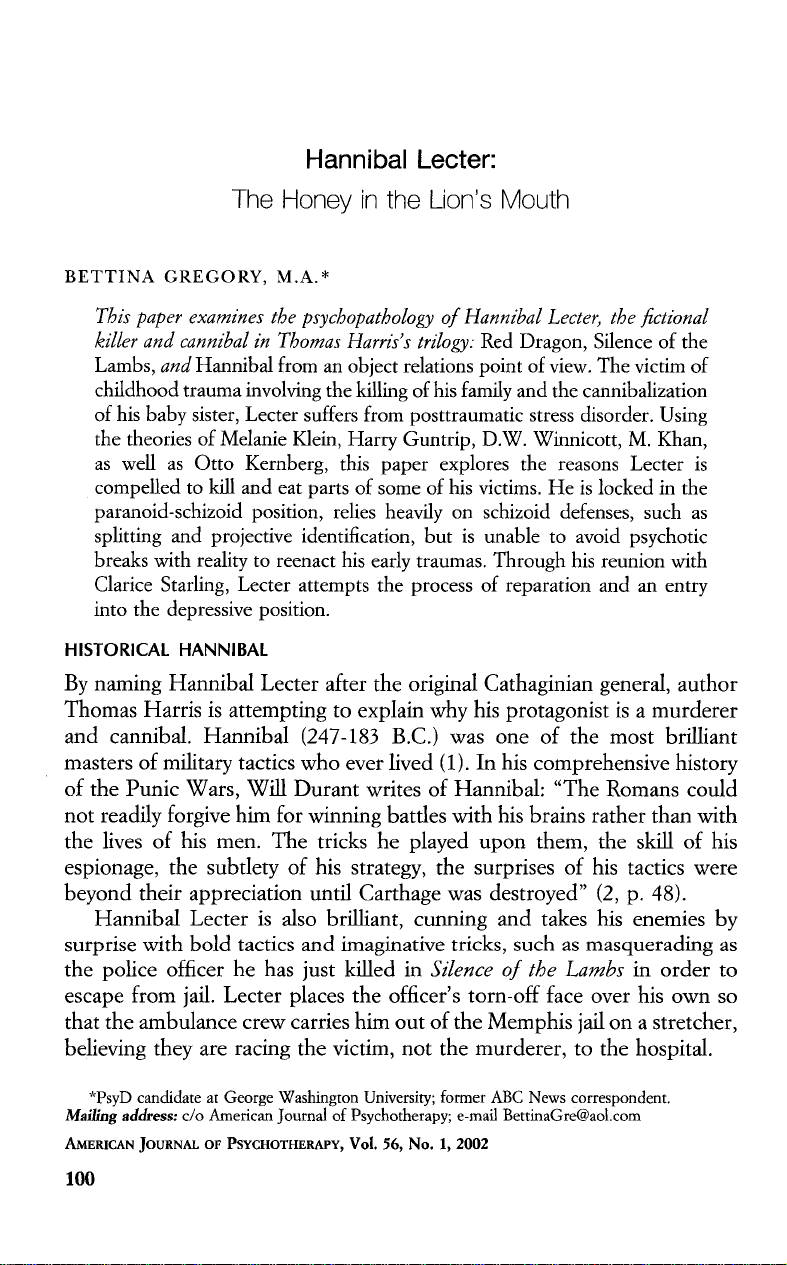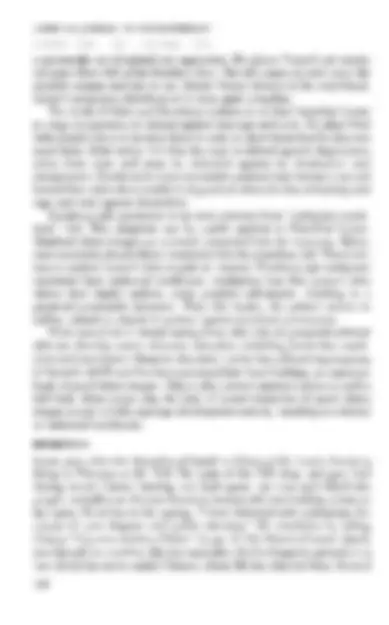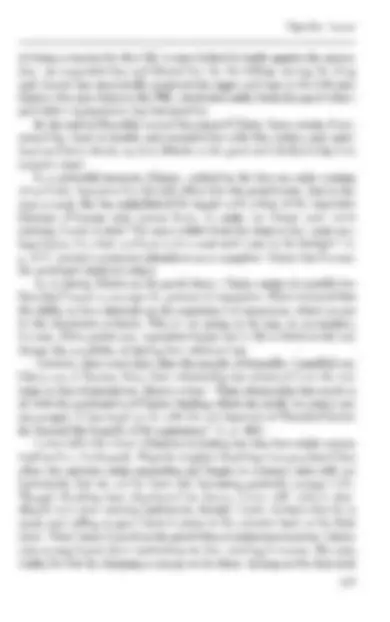











Study with the several resources on Docsity

Earn points by helping other students or get them with a premium plan


Prepare for your exams
Study with the several resources on Docsity

Earn points to download
Earn points by helping other students or get them with a premium plan
Community
Ask the community for help and clear up your study doubts
Discover the best universities in your country according to Docsity users
Free resources
Download our free guides on studying techniques, anxiety management strategies, and thesis advice from Docsity tutors
This paper examines the psychopathology of Hannibal Lecter, the fictional killer and cannibal in Thomas Harris's trilogy: Red Dragon, Silence of the Lambs, and ...
Typology: Study notes
1 / 15

This page cannot be seen from the preview
Don't miss anything!










B E T T I N A G R E G O R Y , M. A. *
This paper examines the psychopathology of Hannibal Lecter, the fictional killer and cannibal in Thomas Harris's trilogy: Red Dragon, Silence of the Lambs, and Hannibal from an object relations point of view. The victim of childhood trauma involving the killing of his family and the cannibalization of his baby sister, Lecter suffers from posttraumatic stress disorder. Using the theories of Melanie Klein, Harry Guntrip, D.W. Winnicott, M. Khan, as well as Otto Kernberg, this paper explores the reasons Lecter is compelled to k i l l and eat parts of some of his victims. He is locked in the paranoid-schizoid position, relies heavily on schizoid defenses, such as splitting and projective identification, but is unable to avoid psychotic breaks with reality to reenact his early traumas. Through his reunion with Clarice Starling, Lecter attempts the process of reparation and an entry into the depressive position.
H I S T O R I C A L H A N N I B A L
By naming H a n n i b a l Lecter after the original Cathaginian general, author Thomas H a r r i s is attempting to explain w h y his protagonist is a murderer and cannibal. H a n n i b a l (247-183 B.C.) was one o f the most b r i l l i a n t masters of military tactics w h o ever lived (1). I n his comprehensive history o f the Punic Wars, W i l l D u r a n t writes of H a n n i b a l : " T h e Romans could not readily forgive h i m for w i n n i n g battles w i t h his brains rather than w i t h the lives o f his men. The tricks he played u p o n them, the s k i l l of his espionage, the subtlety of his strategy, the surprises o f his tactics were beyond their appreciation u n t i l Carthage was destroyed" (2, p. 48). H a n n i b a l Lecter is also b r i l l i a n t , cunning and takes his enemies by surprise w i t h b o l d tactics and imaginative tricks, such as masquerading as the police officer he has just k i l l e d i n Silence of the Lambs i n order to escape f r o m jail. Lecter places the officer's t o r n - o f f face over his o w n so that the ambulance crew carries h i m out o f the Memphis jail on a stretcher, believing they are racing the v i c t i m , not the murderer, to the hospital.
*PsyD candidate at George Washington University; former ABC News correspondent. Mailing address: c/o American Journal of Psychotherapy; e-mail BettinaGre@aol.com AMERICAN JOURNAL OF PSYCHOTHERAPY, Vol. 56, No. 1, 2002
Hannibal Lecter
Cannibalism is another common thread. I t is very likely that General H a n n i b a l was a cannibal since historians tell us that d u r i n g the Punic Wars, retreating soldiers had no choice b u t to eat human flesh. This parallels the actions of the predatory deserters i n Lithuania after W o r l d W a r I I w h o ate Hannibal's sister Mischa. T o r t u r e d by his flashbacks w h i c h cause a psychotic break, H a n n i b a l Lecter reenacts this cannibalistic trag- edy w i t h intellectualized refinement—that is, he eats only the internal organs o f his victims, w h i c h he cooks u p i n t o gourmet dishes. After the Romans defeated the Carthaginian's brother, Hasdrubal, i n Spain, they cut off his head. I n hopes of demoralizing General H a n n i b a l , Roman legions traveled w i t h the severed head a great distance to t h r o w i t over the walls i n t o Hannibal's camp. Receiving this heart-wrenching t r o p h y depressed H a n n i b a l at first, then i t angered h i m , motivating h i m to even greater military feats to avenge his beloved younger sibling's death. ( 1 , 2) There is no record whether General H a n n i b a l suffered f r o m posttraumatic stress disorder or its early equivalent. However, these parallels suggest author Thomas H a r r i s wants us to believe that all of H a n n i b a l Lecter's evil deeds, i n c l u d i n g m u r d e r and cannibalism, are, like those o f his historic namesake, motivated by his desire to avenge the death of his sibling. However, I believe the w o r k of Melanie K l e i n and other object relations theorists, i n c l u d i n g H a r r y G u n t r i p , D. W. W i n n i c o t t , his follower M o h a m m e d K h a n , as w e l l as O t t o Kernberg can give us a deeper insight i n t o w h y H a n n i b a l Lecter is compelled to k i l l and eat the organs of some o f his victims. Simply p u t , Lecter is so overwhelmed by flashbacks o f his childhood traumas, his fantasies o f revenge eclipse his sense of reality to such an extent he must k i l l and eat parts o f some of his victims to r i d himself of his horrors.
H A N N I B A L ' S T R A U M A T I C C H I L D H O O D
thousand pages, before H a r r i s finally gives us any clue about H a n n i b a l Lecter's childhood. Flying f r o m Florence, Italy, to D e t r o i t aboard a 747 w i t h a group o f Canadian tourists, H a n n i b a l Lecter has his first flashback. H e is five or six years o l d. I t is winter, 1944. H e remembers that a few animals managed to survive the artillery and machine-gun fire that has k i l l e d Lecter's parents and left the vast forest on their estate "scarred and blasted." Lecter visualizes a "miserable l i t t l e deer, scrawny, w i t h an arrow i n i t " w h i c h has survived. The " m i x e d bag of deserters" chase the deer
Hannibal Lecter
he swallowed (5 p. 12). After this attack Lecter was forced to wear a face mask to prevent further life-threatening attacks of cannibalistic oral ag- gression, w h i c h K l e i n associates w i t h the paranoid-schizoid position. Lecter's fastasies add support to the theory that he remains locked i n the p r i m i t i v e paranoid schizoid position. I n Hannibal, Lecter experiences a single idealized flashback of his early childhood. Lecter sees his baby sister being given a bath outdoors i n a copper bathtub. The young H a n n i b a l brings her a gleaming purple eggplant, w h i c h he has cut f r o m its stem. H i s gift may be a symbolic baby or a symbolic penis, suggesting that the young H a n n i b a l has matured i n t o the genital or Oedipal stage. W e may also guess his gift signifies that his unconscious sexual desire for his mother has been displaced or generalized onto his sister. K l e i n writes that " w h e n the genital stage sets i n , the child's sadistic impulses have normally been overcome" (6, p. 251). However, this is not always the case. K l e i n posits genital concerns can also be associated w i t h the earlier paranoid-schizoid position. The idealized nature of Lecter's flashback certainly suggests Mischa and the nurse are split-off good objects. Lecter's mien, intensity and hypervigilance also suggest that he sees the rest of the w o r l d as split-off bad objects. " H a n n i b a l Lecter was to some o f the servants a frightening c h i l d , frighteningly intense, preternaturaily k n o w i n g , " H a r r i s writes, " b u t he d i d not frighten the o l d nurse, w h o knew her business and he d i d not frighten Mischa, w h o p u t her star-shaped baby hands flat on his cheeks and laughed i n t o his face" (3, p. 283).
Suddenly Lecter's w o r l d collapses. H i s parents and most of the servants are k i l l e d by the shelling of N a z i panzers. H i s h i g h - b o r n life of ease and laughter i n sunny gardens is over. Somehow he and his sister escape. Maybe H a n n i b a l grabbed Mischa and ran. Perhaps he and his sister h i d , watching the slaughter. Regardless, their reprieve is short-lived. Lecter and his sister are rounded u p by a roving b a n d of starving army deserters and herded i n t o a freezing b a r n like animals, waiting to be butchered and consumed.
THE PARANOID-SCHIZOID POSITION
W h i l e one must b u i l d a case that Lecter never achieved the depressive position before this childhood trauma, there can be no doubt the five- year-old Lecter is firmly locked i n the paranoid-schizoid position d u r i n g his captivity. Lecter is terrified that he too w i l l be k i l l e d , experiencing what Segal calls "the leading anxiety of the paranoid-schizoid p o s i t i o n " that the "persecutory object or objects w i l l get inside the ego and overwhelm and annihilate b o t h the ideal object and the self" (7, p. 26).
A M E R I C A N J O U R N A L O F P S Y C H O T H E R A P Y
Lecter fears annihilation as he watches the l i t t l e deer w i t h the arrow i n its body led to the chopping block. H e tries to repress what F r e u d w o u l d have called this screen memory, b u t he cannot; the memory o f the l i t t l e deer's death floats u n b i d d e n to the surface o f Lecter's "memory palace" (3, p. 252). The deer memory itself acts as a sort of Cerberus—a guard dog at the gates o f Hades—to prevent the deeper, more p a i n f u l memory o f l i t t l e Mischa being k i l l e d and eaten f r o m returning to consciousness. The memory of that scrawny l i t t l e deer is so frightening to Lecter, creating such feelings o f persecutory anxiety, that the result is a psychotic break. K l e i n emphasizes that the greater the paranoid or persecutory fears, the greater the schizoid defenses that come i n t o play, characterized mainly b y split- t i n g. I n Harris's first novel i n this trilogy, Red Dragon, F B I man W i l l Graham tells us Lecter's sixth m u r d e r v i c t i m was a b o w hunter w h o " h a d fallen out of a tree b l i n d five years before and stuck an arrow t h r o u g h his leg." Lecter had been the attending emergency r o o m physician for the b o w hunter's self-inflicted injury (8, p. 70-71). Later, w h e n Lecter is most likely overwhelmed by uncontrollable flashbacks to Mischa's death, he stalks and kills this b o w hunter. H e repeatedly stabs his v i c t i m , carving a pattern o f wounds i n t o his body that replicates a chart of wounds depicted i n a medieval medical textbook. W h e n G r a h a m goes to question Lecter, he notices Lecter has a copy o f the medieval w o u n d chart i n the waiting r o o m of his psychiatric office. Once he notices the w o u n d pattern is the same as those carved into the victim's body, Graham arrests Lecter for the murder. Lecter's delusion is that he must k i l l the hunter i n order to u n d o what has happened to the l i t t l e deer and to force the memories, w h i c h are overwhelming h i m w i t h persecutory anxiety, to be disassociated once again. However, even the p r i m i t i v e defense o f disassociation fails; i t cannot r i d h i m of the overwhelming terror of the fantasy. O n l y the enactment of this r i t u a l murder enables Lecter to get r i d o f his paranoid fears for the time being. K l e i n w o u l d explain that Lecter is k i l l i n g what he has projected outside himself as a way to alleviate the unbearable persecutory anxiety he experiences inside i n his paranoid-schizoid position. H e does not eat this v i c t i m. By reproducing the w o u n d pattern shown i n the medieval chart, Lecter is, however, trying to convert the b o w hunter's body f r o m a persecutory evil object i n t o an artistic or instructive good one. This display of wounds may also be Lecter's attempt to reproduce Christ's crucifixion, since the b o w hunter has died for the sins of the roving deserters w h o k i l l e d and ate his sister.
A M E R I C A N J O U R N A L O F P S Y C H O T H E R A P Y
frequently directed at siblings. This means that Lecter has unconscious hatred and jealousy of his l i t t l e sister Misha. However, i t is very likely he is defending against i t by splitting Mischa off i n t o an overidealized good object and displacing that hatred onto the b o w hunter. This can only serve to w h i p Lecter up i n t o a more murderous fury.
C A N N I B A L I S M
Once the k i l l i n g is done, H a n n i b a l the Cannibal butchers b o t h the deer and the hunter w i t h skill and precision, excising the healthy thymus and pancreas f r o m the dead b o w hunter, leaving his victim's cirrhotic liver i n his corpse. The diseased organ is too literally a bad object, one w h i c h holds no attraction for Lecter. However, he eats the healthy organs i n order reintroject bad part-objects i n a physical sense. This act o f cannibalism is a literal enactment of what K l e i n has called a cycle of internalized persecution. A n x i e t y is being defended against by introjecting the bad object. K l e i n writes that i n the earliest pregenital stages o f l i b i d i n a l organization, sadistic impulses are paramount. "As the analysis of every grown-up person demonstrates, the small c h i l d goes through a cannibal- istic phase w i t h w h i c h are associated a wealth o f cannibalistic fantasies. These fantasies, although still centered on eating up the mother's breast or her whole person, are not solely concerned w i t h the gratification of a p r i m i t i v e desire for nourishment. They serve to gratify the child's destruc- tive impulses" (6, p. 253). The difference between every ' g r o w n - u p ' K l e i n has seen i n analysis and H a n n i b a l Lecter, regressed to the oral aggressive stage of the paranoid-schizoid position, is that Lecter is unable to gratify his destructive impulses t h r o u g h fantasy. T h e reason for this is because these murderous fantasies cause Lecter to re-experience the trauma of his sister's murder at the same time.
Kleinian theory also suggests that one may equate an eating disorder or substance abuse w i t h the literal need to internalize a negative internal introject. Thus eating things allows one to symbolically internalize a negative object. G u n t r i p ' s formulation o f the schizoid position is that love gone hungry leads to love being destructive (9). I n all eating disorders, G u n t r i p theorizes, food symbolizes the early tantalizing object, w h i c h is h o w he defines the good object. Summers further explicates G u n t r i p ' s theory: Binge eating is the uncontrolled desire to secure the object by ingesting it. Bulimia has the same root, but includes the fear of having destroyed the object by devouring it. I f the craving to devour the object is overwhelmingly intense, it may threaten ego loss, resulting in an overwhelming fear of the longed-for
Hannibal Lecter
object and a stubborn defense against i t. Anorexia is a schizoid defense against the desire to devour the object. (10 p. 59)
v i c t i m , Baltimore Symphony flutist Benjamin Raspail, i n t o a gourmet dish, w h i c h was served at a formal dinner party to raise money for the sym- phony. I f we regard this as Lecter's attempt to physically convert the b a d object causing persecutory anxiety i n t o a good one, by t u r n i n g a part of i t i n t o a delicious dish used for an altruistic purpose, then G u n t r i p ' s theory concerning binge eating can also be used to explain Lecter's cannibalism. Lecter does not eat his victims' flesh, only their pancreases, thymus glands, or i n the case of Paul Krendler o f the Justice Department i n
stylized re-enactment o f the deserters eating his sister's entire body by consuming the key internal organs or part-objects of some of his victims. Nevertheless, because he was once prey, Lecter has become a predator to satisfy his otherwise uncontrollable desire to control or get r i d of his extreme anxiety by ingesting or re-introjecting objects that he feels literally threaten to devour h i m. Followers of W i n n i c o t t , such as K h a n (11), add a valuable c o n t r i b u t i o n to our understanding o f Lecter's cannibalism. K h a n proposes that children subjected to cumulative trauma f o r m a false self, halting the development o f psychological capacity and resulting i n an inability to use symbolism. Those children act to discharge tension because they are incapable o f using symbolic mental activity, such as language. Thus Lecter's acting out o f the cannibalistic urges, according to K l e i n , may be an example of an arrested psyche w i t h l i t t l e capacity for symbolism, covered by a false-self organi- zation.
Lecter the war has never ended. H i s flashbacks and disturbing nightmares about his sister's death and the k i l l i n g of the l i t t l e deer certainly meet the diagnostic criteria for P T S D. Lecter feels detached and estranged f r o m others; he has difficulty displaying loving feelings; he is hypervigilant i n a p r i m i t i v e , sensory way, especially for smells and odors, associated w i t h the reptilian part of the brain w h i c h controls fight-or- flight responses to threatening s t i m u l i. H e also makes efforts to avoid the thoughts and feelings associated w i t h the severe traumas of his childhood, b u t is unsuccessful. Lecter's cannibalism may also be regarded as a literal and negative enactment o f the Catholic rite of communion. A t the moment the wine and
Hannibal Lecter
drives home the Palazzo Capponi's depth of meaning to Lecter, by w r i t i n g that his appointment is "a considerable prize for several reasons: The spaces, the height of the palace rooms, are i m p o r t a n t to D r. Lecter after his years of cramped confinement. M o r e importantly, the palace is the only b u i l d i n g that approaches i n dimension and detail the memory palace he has maintained since y o u t h. " Finally, H a r r i s explains, the collection o f ancient manuscripts and books inside the palace allow Lecter an oppor- t u n i t y " t o indulge a certain curiosity about himself" (3, p. 136). Thus Lecter is able to reintroject the good breast, w h i c h has been split off for such a long time. Lecter also spends time doing brass rubbings i n Santa Croce, another church that symbolizes the good breast. H e stores his art materials b e h i n d the altar at Santa Croce, as a way to feel that part of h i m is literally inside this good object, w h i c h may also represent his mother's body. Lecter is t r u l y sorry that detective Pazzi's plot to capture h i m forces h i m to flee the city that represents home, mother and the good breast to h i m. As soon as Lecter leaves the psychic protection afforded h i m by Florence, he begins to decompensate. I n fact he experiences the flashback to Mischa's k i l l i n g aboard the 747 flying h i m f r o m Florence to D e t r o i t. Because Lecter splits so readily, i t should be no surprise that churches,
stories about church collapses. " D i d you see the recent one i n Sicily? Marvelous! The facade fell on sixty-five grandmothers at a special Mass"
" Y o u may have noticed i n the paper yesterday G o d dropped a church roof o n t h i r t y - f o u r o f H i s worshipers i n Texas Wednesday n i g h t - j u s t as they were groveling t h r o u g h a h y m n " (8, p. 349). Lecter believes G o d is sadistic and cruel because of the way the deity answered his boyhood prayer to see his sister Mischa again. T o H a n n i b a l any part o f Mischa is a good part object-including her teeth. But her killers have extracted those m i l k teeth, w h i c h are symbols of a child's oral aggression, and t h r o w n them i n t o a latrine to be despoiled and defecated u p o n. H a n n i b a l blames G o d for this atrocity and thereafter cannot see the deity as a good object. After catching sight of those m i l k teeth, H a r r i s
deity, other than to recognize that his predations paled besides those o f G o d , w h o is i n irony matchless, and i n w a n t o n malice, beyond measure" (3, p. 256). So Lecter's G o d has become a bad object, w h o wantonly and wickedly destroys even the f a i t h f u l. H e feels powerless, unable to predict
A M E R I C A N J O U R N A L O F P S Y C H O T H E R A P Y
or control what this persecuting G o d might do t o wreak havoc on his w o r l d. H e is also using the n o t i o n of an evil and cruel G o d to rationalize t r y i n g to play G o d himself.
OMNIPOTENCE AND PROJECTIVE IDENTIFICATION H a n n i b a l Lecter is also a psychological cannibal. H e kills his patients' souls then consumes them. H e does so by projective identification, an i m p o r t a n t defense mechanism for those, like H a n n i b a l Lecter, fixated i n the para- noid-schizoid position. I n the first place, Lecter's career choice to become a psychiatrist represents an overarching desire to get inside the minds o f his disturbed and, at times, murderous patients so that he can control them and the rage they evoke i n himself. T h e n he uses t h e m as containers for the anger and rage he projects, w h i c h they act out i n various ways.
because he fears the man w h o arrested h i m for murder. Lecter torments Graham, w h o comes to interview h i m i n prison about another serial murderer on the loose. " D o you k n o w w h y you caught me?" Lecter asks
italics by author). H a r r i s gives a strong indication Lecter is successful i n projecting all the evil murderous aspects o f himself onto the F B I forensic specialist. As Graham walks out of the prison, H a r r i s writes: Graham " h a d the absurd feeling that Lecter was w a l k i n g out w i t h h i m " (8, p. 86).
Graham has k i l l e d a man named H o b b s. Afterwards, he became so depressed that he was admitted to a mental i n s t i t u t i o n. Graham has taken pains to conceal his hospitalization, b u t i t is revealed i n the t a b l o i d
Lecter continues projecting his o w n feelings about k i l l i n g i n t o Graham w r i t i n g t o h i m : " I want to help you W i l l , and I ' d like to start by asking you this: when you were so depressed after you shot M r. Garrett Jacob H o b b s to death, i t wasn't the act that got you d o w n , was it? Really d i d n ' t you feel so bad
Graham ends u p coming close to what might commonly be called a nervous breakdown because he cannot abide the n o t i o n that he, like H a n n i b a l Lecter, is a killer.
Mason Verger, the wealthy heir to a slaughterhouse fortune, for his sins. Lecter was angered that Verger had "gotten a w a l k " o n what Verger calls
A M E R I C A N J O U R N A L O F P S Y C H O T H E R A P Y
a spectacular act o f animal oral aggression. She places Verger's pet moray eel onto what's left of her brother's face. T h e eel clamps its teeth onto the invalid's tongue and rips i t out. Mason Verger drowns i n his o w n b l o o d. Lecter's projective identification is once again complete. The w o r k of K l e i n and Kernberg explains to us that H a n n i b a l Lecter is using omnipotence to defend against oral rage and envy. H e plays G o d w i t h people's lives to devalue t h e m i n order to show them that he does not need them. K l e i n writes (13) that the need to defend against dependence arises f r o m envy and must be defended against by devaluation and omnipotence. Kernberg believes narcissistic patients have intense envy and hatred that makes them unable to depend on others for fear o f i n c i t i n g oral rage and envy against themselves. Kernberg calls narcissism i n its most extreme f o r m "malignant narcis- sism" (14). This diagnosis can be readily applied to H a n n i b a l Lecter. Idealized object images are normally-integrated i n t o the superego. M a l i g - nant narcissists absorb them completely i n t o the grandiose self. This is one way to explain Lecter's lack of guilt or remorse. Kernberg says malignant narcissists have antisocial tendencies, explaining that they project onto others their highly sadistic, cruel, punitive self-attacks, resulting i n a paranoid personality structure. Thus, like Lecter, the patient reverts to sadism, attacking objects to protect against perceived persecution. K l e i n puts i t more simply saying those w h o rely on paranoid-schizoid defenses develop severe character disorders, i n c l u d i n g borderline condi- tions and narcissistic character disorders. Lecter has suffered deprivations i n his early childhood that have prevented h i m f r o m b u i l d i n g u p a memory bank o f good object images. This is w h y Lecter's memory palace is such a hell hole. K l e i n posits that the lack of stored memories of good object images arrests or kills superego development entirely, resulting i n criminal or antisocial tendencies.
R E P A R A T I O N Seven years after the Memphis jail break i n Silence of the Lambs, Lecter is l i v i n g i n Florence as D r. Fell. H e reads o f the F B I d r u g r a i d gone bad d u r i n g w h i c h Clarice Starling, the lead agent, has shot and k i l l e d t w o people, i n c l u d i n g an African-American w o m a n w h o was h o l d i n g a baby i n her arms. H e writes to her saying, " I have followed w i t h enthusiasm the course of your disgrace and public shaming." H e concludes by telling Clarice " Y o u are a w a r r i o r , Clarice" (3, p p. 31-32). H a n n i b a l Lecter clearly sees himself as a w a r r i o r , like his namesake, the Carthaginian general, i n a war w h i c h has never ended. Clarice, whose life has thus far been devoted
Hannibal Lecter
to being a w a r r i o r for the F B I , is n o w locked i n battle against the agency that has suspended her and blamed her for the killings d u r i n g the d r u g raid. Lecter has successfully projected his anger and rage at the F B I i n t o Clarice w h o n o w believes the F B I , w h i c h had earlier been her good object and father replacement, has betrayed her. By the end of Hannibal, Lecter has rescued Clarice f r o m certain death, nursed her back to health, and provided her w i t h fine clothes and w a r m food as Clarice slowly replaces Mischa as the good and idealized object i n Lecter's m i n d. I n a p o w e r f u l moment, Clarice, decked i n the low-cut satin evening dress Lecter has given her, literally offers h i m the good breast, that is, her o w n to suck. She has embellished the nipple w i t h a drop o f the expensive Chateau d ' Y q u e m w i n e Lecter loves, to make her breast even more enticing. Lecter is avid: " H e came swiftly f r o m his chair to her, went on a knee before her chair and bent to her coral and cream i n the firelight" (3, p. 477). Lecter's projective identification is complete; Clarice has become his good and idealized object. By replacing Mischa as the good object, Clarice makes i t possible for H a n n i b a l Lecter to attempt the process of reparation. K l e i n believed that the ability to love depends on the experience o f reparation, w h i c h occurs i n the depressive position. This is not going to be easy to accomplish, because, K l e i n points out, reparation begun late i n life is likely to fail and thwart the possibility of lasting love relationships. However, three years later after the m u r d e r of Krendler, H a n n i b a l and Clarice are i n Buenos Aires, their relationship has advanced f r o m the oral stage to that of genital sex. H a r r i s writes: " T h e i r relationship has m u c h to do w i t h the penetration of Clarice Starling, w h i c h she avidly welcomes and encourages. I t has m u c h to do w i t h the envelopment of H a n n i b a l Lecter far beyond the bounds o f his experience" (3, p. 483). Lecter still suffers f r o m delusions i n c l u d i n g one that time might reverse itself and r u n backwards. Physicist Stephen H a w k i n g once postulated that when the universe stops expanding and begins to contract, time w i l l r u n backwards, that we w i l l be b o r n o l d , becoming gradually younger (15). T h o u g h H a w k i n g later abandoned his theory, Lecter still holds i t dear. Should time start r u n n i n g backwards, though, Lecter declares that he is ready and w i l l i n g to give Clarice's place i n the universe back to his l i t t l e sister. Thus Clarice's perch as the good object is indeed precarious. Clarice tries to stop Lecter f r o m ruminating on time r u n n i n g i n reverse. She tests reality for h i m by d r o p p i n g a teacup on the floor. As long as the shattered